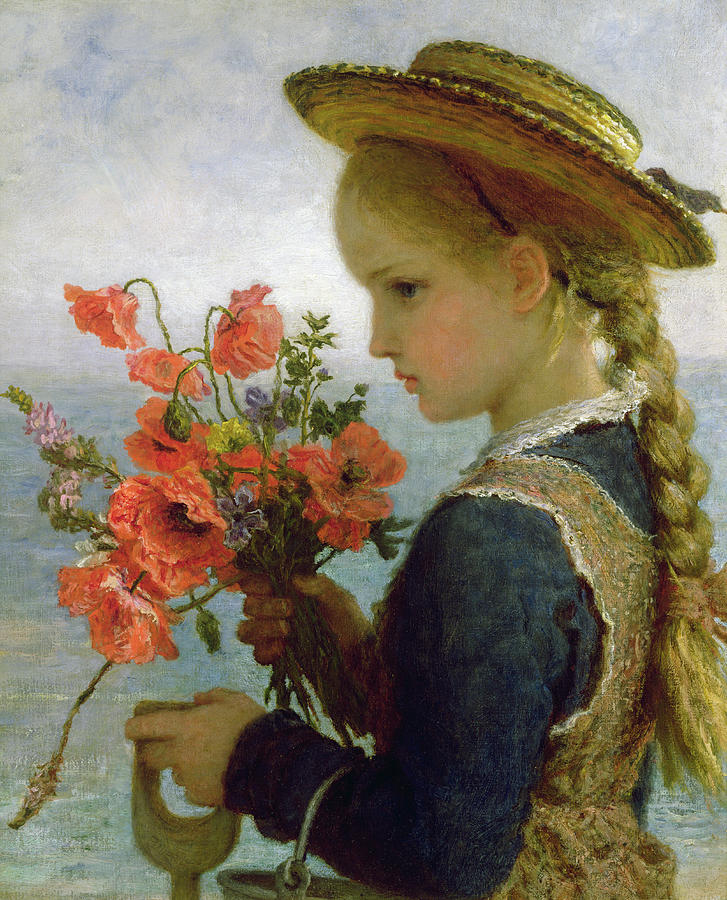
This well-known poem appeared in Thompson’s first volume Poems in 1893. It is dedicated to Monica, the eldest of the four Meynell daughters. It was probably written in 1891 when she was 11 years old.
A child (Monica) and a man (Thompson) walk together. He feels the difference between their ages as an obstacle between them:
But between the clasp of his hand and hers
Lay, felt not, twenty withered years.
The girl picks a poppy and offers it to him, saying “Keep it, long as you live!” This is her childish way of expressing her spontaneous love. But the man fears that this love is impossible:
And suddenly ’twixt his hand and hers
He knew the twenty withered years—
No flower, but twenty shrivelled years.
Indeed, he thinks that at her age she does not really understand love and that her feelings will change with the years; he repeatedly stresses her fickleness:
But you, who love nor know at all
[…]
Who know not love from amity,
[…]
Do you know what the days will do to you?
To your Love and you what the days will do,
O frankly fickle, and fickly true?
Then come the famous stanza, where he calls himeself her “foster-lover,” meaning that he will love her only during the time of her childhood:
I am but, my sweet, your foster-lover,
Knowing well when certain years are over
You vanish from me to another;
Yet I know, and love, like the foster-mother.
To him, her love will wither away in the same way as the flower, and only a dream will remain of it:
For my brief life-while I take from you
This token, fair and fit, meseems,
For me—this withering flower of dreams.
Finally he calls this love “your flower of withered dream” and “my withered dreams.” With Thompson, child-love always ends in nostalgia and regret, because of the transient nature of childhood.
The Poppy
To Monica
Summer set lip to earth’s bosom bare,
And left the flushed print in a poppy there:
Like a yawn of fire from the grass it came,
And the fanning wind puffed it to flapping flame.
With burnt mouth red like a lion’s it drank
The blood of the sun as he slaughtered sank,
And dipped its cup in the purpurate shine
When the eastern conduits ran with wine;
Till it grew lethargied with fierce bliss,
And hot as a swinkèd gipsy is,
And drowsed in sleepy savageries,
With mouth wide a-pout for a sultry kiss.
A child and man paced side by side,
Treading the skirts of eventide;
But between the clasp of his hand and hers
Lay, felt not, twenty withered years.
She turned, with the rout of her dusk South hair,
And saw the sleeping gipsy there;
And snatched and snapped it in swift child’s whim,
With—“Keep it, long as you live!”—to him.
And his smile, as nymphs from their laving meres,
Trembled up from a bath of tears;
And joy, like a mew sea-rocked apart,
Tossed on the wave of his troubled heart.
For he saw what she did not see,
That—as kindled by its own fervency—
The verge shrivelled inward smoulderingly:
And suddenly ’twixt his hand and hers
He knew the twenty withered years—
No flower, but twenty shrivelled years.
“Was never such thing until this hour,”
Low to his heart he said; “the flower
Of sleep brings wakening to me,
And of oblivion memory.
“Was never this thing to me,” he said,
“Though with bruisèd poppies my feet are red!”
And again to his own heart very low:
“O child! I love, for I love and know;
“But you, who love nor know at all
The diverse chambers in Love’s guest-hall,
Where some rise early, few sit long:
In how differing accents hear the throng
His great Pentecostal tongue;
“Who know not love from amity,
Nor my reported self from me;
A fair fit gift is this, meseems,
You give—this withering flower of dreams.
“O frankly fickle, and fickly true,
Do you know what the days will do to you?
To your Love and you what the days will do,
O frankly fickle, and fickly true?
“You have loved me, Fair, three lives—or days:
’Twill pass with the passing of my face.
But where I go, your face goes too,
To watch lest I play false to you.
“I am but, my sweet, your foster-lover,
Knowing well when certain years are over
You vanish from me to another;
Yet I know, and love, like the foster-mother.
“So, frankly fickle, and fickly true,
For my brief life-while I take from you
This token, fair and fit, meseems,
For me—this withering flower of dreams.”
The sleep-flower sways in the wheat its head,
Heavy with dreams, as that with bread:
The goodly grain and the sun-flushed sleeper
The reaper reaps, and Time the reaper.
I hang ’mid men my needless head,
And my fruit is dreams, as theirs is bread:
The goodly men and the sun-hazed sleeper
Time shall reap; but after the reaper
The world shall glean of me, me the sleeper!
Love, love! your flower of withered dream
In leavèd rhyme lies safe, I deem,
Sheltered and shut in a nook of rhyme,
From the reaper man, and his reaper Time.
Love! I fall into the claws of Time:
But lasts within a leavèd rhyme
All that the world of me esteems—
My withered dreams, my withered dreams.
Source of the poem: Selected Poems of Francis Thompson, Burns, Oates & Washbourne Ltd (1908), digitised on Internet Archive and transcribed as Project Gutenberg ebook. A slightly different version can be found in The works of Francis Thompson, Poems: Volume 1, New York: Charles Scribner’s Sons (1913), digitised on Internet Archive, see also PoemHunter and PoetryNook.
This is a revised version of a post previously published on Agapeta, 2016/08/15.

